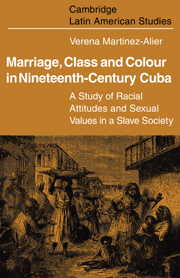 Marriage, Class and Colour in Nineteenth Century Cuba
Marriage, Class and Colour in Nineteenth Century Cuba Summary
When I first went to Cuba in 1967 my intention was to study its present-day family organization. I wanted to test the various hypotheses developed by sociologists and social anthropologists on family structure in other parts of the Caribbean and examine the extent to which the 1959 revolution had already brought about changes in the Cuban family. For bureaucratic reasons, however, I was only able to spend two months in the field in a small, predominantly coloured coffee-growing village in the Sierra Maestra. This brief stay allowed me to gain an overall impression of the villagers' family organization – the prevalence of stable consensual unions – but was clearly insufficient to understand its complexities, and much less to assess the impact of the revolution, although there were many indications that it had already affected family values in some ways. Thus I was often asked by the villagers, and in particular by the women, whether I had been sent by the revolutionary government in connection with the ‘collective marriage’ campaign, which had already reached other parts of the island and whose aim it was to give those couples who had so far lived in concubinage the opportunity to marry formally. While the women seemed to welcome this measure, men appeared to be more evasive. Also, the local political secretary, one of the judges of the local people's court, and the secretary of the peasant association pointed out repeatedly that as high-ranking members of the community they would have to get formally married at some point.
- Type
- Chapter
- Information
- Marriage, Class and Colour in Nineteenth Century CubaA Study of Racial Attitudes and Sexual Values in a Slave Society, pp. vii - ixPublisher: Cambridge University PressPrint publication year: 1974
